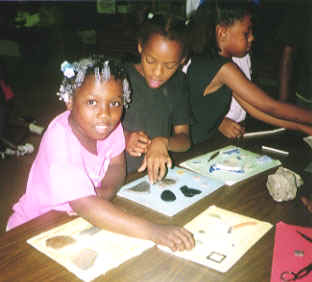|
Education is inherent in all aspects of Chicora's work. Archaeological research
generates newspaper publicity bringing the past to life for thousands of readers.
Preservation assessments are a vehicle to educate museums and library staffs in a range of
preservation issues. Consulting on archaeological conservation is an opportunity to
emphasize the importance of ensuring that archaeological collections are available for
future researchers.
 Our approach to public education is unique -- we are not trying to teach kids how to be
archaeologists. We are not lecturing them on dates, arrowheads, and excavation techniques.
Instead, we are using the thrill of the past to turn kids on to learning. Chicora
Foundation develops socially responsive programs -- programs that reach out to the low
income, at-risk students and offer them an incentive to learn. Programs, for example, that
emphasize the ethnic heritage of African American students, encourage them to explore
their "roots," and help them see that they have a heritage to be proud of. Our approach to public education is unique -- we are not trying to teach kids how to be
archaeologists. We are not lecturing them on dates, arrowheads, and excavation techniques.
Instead, we are using the thrill of the past to turn kids on to learning. Chicora
Foundation develops socially responsive programs -- programs that reach out to the low
income, at-risk students and offer them an incentive to learn. Programs, for example, that
emphasize the ethnic heritage of African American students, encourage them to explore
their "roots," and help them see that they have a heritage to be proud of.
Chicora is equally committed to adult programs. For example, through our program
entitled, "Preserving Your Family Treasures," we help people care for their
family heirlooms -- photographs, diaries, letters, quilts, baptismal dresses, and other
precious items. We have also been invited speakers at a number of functions -- ranging
from Rotary Clubs to Boards of Realtors to historical organizations. In every case,
Chicora representatives have taken the opportunity not simply to talk about our work, but
to explore ways that the public can make a difference in the preservation of South
Carolina's heritage.
Program Areas
Work in the Schools -- A major aspect of Chicora's
education work includes developing programs for teachers and working with school kids.
Chicora's educational programs are among the most extensive in South Carolina, typically
reaching about 4,000 kids a year. Our in-school programs emphasize hands-on activities,
designed to involve students in the presentation. We realize that students, of any age or
ability, learn best when they are active participants. Our programs cover a wide range of
South Carolina heritage -- prehistoric Native Americans, European colonists, and African
American slaves and freedmen -- and focus on the contributions and influences of each of
these groups in our heritage today. We work with teachers to develop programs that are
specifically suited to their class and their needs.
Curricula Development -- Chicora has prepared a number
of curricula for classroom teachers. We have also participated in a wide range of
professional seminars and workshops on interpreting the past for the public.
Teacher Programs -- Chicora has offered a variety of
workshops and in-service training programs for teachers. These are designed to help
teachers more effectively integrate history, archaeology, and social studies in the
classroom. We focus not only on unique methods, but also on the topics important for
students to understand. Most importantly, we emphasize the need for students to be able to
critically analyze and evaluate information. We have also worked with teachers in
continuing education programs and have even worked on a summer program for teachers to
earn graduate-level course credit doing archaeology and learning new techniques for
teaching the past to their kids.
Heritage Marketing -- We have attracted considerable
press attention, with many articles going out on the AP wire. Our work, and business
partners, have been featured in the New York Times, as well as the Wall
Street Journal. Our activities have reached thousands of individuals, promoting not
just the Foundation, but also specific projects and a general respect for heritage.
Heritage Interpretation -- Chicora Foundation has
worked with a wide range of groups to develop publicly oriented brochures, exhibits, and
audio-visual programs. These have been designed to provide simple, concise information on
archaeology for the public. We have also developed interpretative plans for parks and
developments, working to convey the meaning and importance of broad historical themes.
These activities have included public relations recommendations, development of signage
and displays, production of brochures, and publication of popular articles in property
owner newsletters.
For information on our education programs, please contact
Debi Hacker.
|